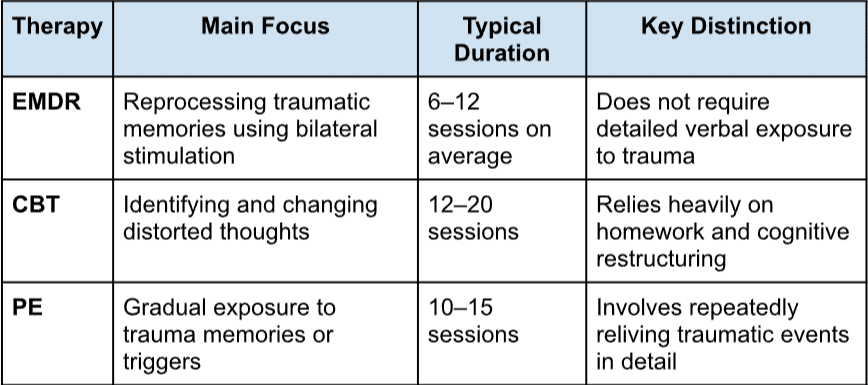EMDR (Eye Movement Desensitization and Reprocessing) has gained worldwide recognition as one of the most effective therapies for trauma, anxiety, and emotional distress. But how does EMDR work? Why is it so effective, and what can you really expect from it?
Over the past few decades, research has shown that EMDR not only reduces the symptoms of trauma. It can also improve self-esteem, mood, and overall resilience, often faster than traditional talk-based therapy.
If you’re considering EMDR therapy in New York, Daniel Criado is your best option. Contact him and find out how this approach works in real life.
What Are Experts Saying About EMDR?
Experts and clinicians consider EMDR therapy to be one of the most effective and efficient first-line treatments available for trauma. They emphasize its rapid ability to achieve significant and lasting relief in a limited number of sessions, which positions it favorably compared to traditional talk therapies.
Specialists recognize its value in directly targeting the way the brain stores traumatic memories. They also value the bilateral reprocessing mechanism, which helps the brain unlock the memory and convert the distressing memory into a neutral, narrative memory, freeing it from its intense emotional and physical burden.
However, the consensus emphasizes the critical importance of a certified and experienced therapist. EMDR is a highly structured therapy, and its success depends directly on its proper application.

Official Guidelines and Recommendations
Official guidelines and recommendations from leading mental health institutions worldwide endorse EMDR Therapy as an effective, evidence-based treatment for Posttraumatic Stress Disorder (PTSD) and trauma.
EMDR is officially recognized as an effective first-line treatment option for PTSD. It’s supported by clinical guidelines from leading international organizations, including:
- World Health Organization (WHO): recommends EMDR for adults and children exposed to trauma.
- American Psychological Association (APA): lists EMDR among its strongest evidence-based PTSD treatments.
- U.S. Department of Veterans Affairs (VA) and Department of Defense (DoD): include EMDR in their clinical practice guidelines for military veterans and active-duty service members.
- National Institute for Health and Care Excellence (NICE) in the UK: endorses EMDR for trauma-related conditions.
The global consensus is clear: EMDR is not an experimental therapy, but a highly recommended treatment that should be considered a fundamental part of any trauma recovery plan.
How EMDR Measures Up to Other Therapies
To determine if really does EMDR really work, we must compare it with other proven methods, such as Cognitive Behavioral Therapy (CBT) or Prolonged Exposure (PE). All three approaches are evidence-based, but differ in their approach and process.

EMDR often produces significant improvement in fewer sessions and with less emotional exhaustion. Many clients prefer it because it allows the brain to heal naturally without repeatedly retelling painful stories.
Who Might Benefit from EMDR?
Although EMDR was originally developed to treat PTSD, it has since proven effective for a wide variety of emotional and psychological challenges. Individuals who may benefit include those who struggle with:
- Traumatic experiences (accidents, assault, loss, natural disasters).
- Anxiety and panic attacks.
- Depression and self-esteem issues.
- Complicated grief or unresolved loss.
- Relationship trauma and attachment wounds.
- Chronic stress or performance anxiety.
EMDR can also help people who feel “stuck”, as if their body or mind is still reacting to a past event, even when they know it’s over. The therapy works by reconnecting the rational and emotional parts of the brain, allowing the nervous system to settle and the mind to regain perspective.
Reach out to Daniel Criado Mental Health to learn more about personalized EMDR therapy in New York for trauma, anxiety, and stress recovery.
What to Expect If You Try EMDR
A typical EMDR process begins with a few preparatory sessions. During these sessions, the therapist gathers information about the patient’s background and teaches relaxation and stabilization techniques. Once the patient is ready, the therapy progresses through the eight phases of EMDR, which include identifying the target memories, reprocessing them, and integrating new positive beliefs.
During an EMDR session:
- You’ll focus briefly on a distressing memory while following your therapist’s hand or another form of bilateral stimulation (like tapping or tones).
- The process activates both hemispheres of the brain, helping you reprocess the memory until it loses its intense emotional charge.
- As sessions progress, you may notice the memory feeling distant or less painful, and positive beliefs (such as “I am safe now” or “It wasn’t my fault”) begin to replace negative ones.

How Long Does EMDR Take to Work?
How long does EMDR take to work? There’s no one-size-fits-all answer; each person’s recovery time is different. Some clients notice relief after just a few sessions, while others need more time, depending on the complexity of their trauma and overall emotional history. Complex or chronic traumas may take longer, but the results are often lasting and transformative.
Consistency is key: EMDR therapy is self-based, meaning the brain continues processing between sessions, even after you leave the office.
So, Does EMDR Work?
After decades of research and thousands of success stories, the answer is clear: EMDR works, and it works very well. It’s one of the few therapies recognized worldwide for its effectiveness in trauma recovery, anxiety reduction, and emotional integration. Whether your pain stems from a single event or a lifetime of difficult experiences, EMDR can help your brain heal naturally, safely, and permanently.
At Daniel Criado Mental Health, EMDR therapy in New York City goes beyond symptom relief. Sessions are designed to foster resilience, self-understanding, and long-term emotional health in a compassionate and culturally sensitive environment.
Take the next step toward lasting healing. Contact Daniel Criado today and discover how EMDR can support your healing.







